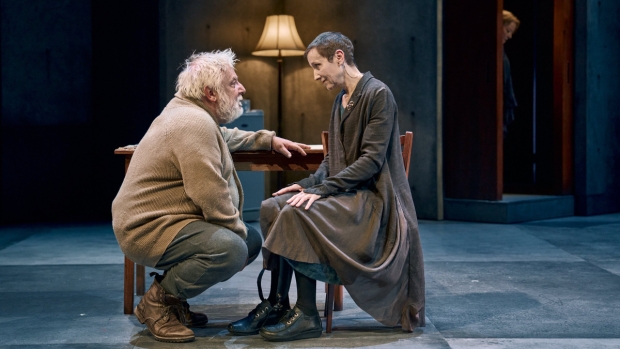”John Gabriel Borkman” at the Bridge Theatre – review

© Manuel Harlan
You can always rely on Henrik Ibsen to throw a grenade of gloom into any bad situation. When Nicholas Hytner planned the staging of the great Norwegian brooder’s penultimate play, written in 1896, he could hardly have predicted that it would open in the midst of a financial crisis, with the pound tanking, the markets queasy and the rising cost of living on everyone’s mind.
But he clearly did realise that this story of a disgraced banker whose ambition has ruined his family and friends as he tried one last roll of the dice to make a fortune had a lot to say to our own age. In Lucinda Coxon’s brisk, contemporary translation, Borkman’s dream is not for personal wealth but to enrich society. “I was poised to generate such prosperity! All the new mines I’d open! The new shafts I’d sink! The waters power, quarries, the factories brought to life feeding the trade routes… A great humming network all over the globe. Only I could have done that.”
You hear the conviction politician, the gambling city banker in the unreflective hubris of much of what he says. The idealism is there but so is the entitlement. Yet the greatness of Ibsen’s play is that it is so much more than a study of a man whose delusions imprison him even more strongly that the gaol to which he was once sent; it’s a staggering, dark portrayal of family dynamics that have been warped by misplaced values and the denial of love.
The intensity of Hytner’s production, powered by Simon Russell Beale as Borkman, Clare Higgins as his wife Gunhild and Lia Williams as her sister and his lost love Ella, means that the resonances of the writing, the way that Borkman has “traded” love for his dream, the imagery of wealth and loss, gleam as strongly as the riches Borkman imagines mining. You realise how all the characters are subservient to their past, and blind about their future – apart from Erhart, Borkman’s son, who is determined to pursue only his own present happiness.
The sense of claustrophobia afflicting the family group is emphasised by Anna Fleischle’s brooding, corrugated set which conjures the modernist palace in which Borkman is confined, pacing the landings of the upper room while Gunhild watches TV and tries to shut out the noise below. The sheer size of it separates each character from the other; they are always trying to have intimate conversations while shouting across a vast expanse of space.
In the same way, their essential loneliness is quietly underlined by the fact that there is only one chair for anyone to sit on. In the great central scene when Ella confronts John Gabriel about the way he has sacrificed their love for something he regarded as more precious, the shock of him kneeling in front of her, closing the distance between them, is almost visceral. Yet when she leans to kiss him, he still shies away.
When the sisters finally hold hands at the close, years of bitter misunderstanding suddenly swept away, it feels electric; a touch in a play in which feeling is frozen, like the windows facing out onto the bleak landscape. The suppression and misanthropy is brutal. “I have no further use for you,” says Borkman, dismissing his only friend (Michael Simkins). “Women ruin everything,” he muses, a little twitch of his shoulders revealing his distaste.
Russell Beale, rumpled and ragged, makes each rejection count. His voice and his silences beautifully chart Borkman’s denials, of his self and of others, registering the pain, but never reaching anything approaching self-knowledge. Williams paints her agony across her face, comments received like blows, each change of mood marked by tiny, devastating inflections, while Higgins prowls like a wounded beast, her bitterness and loss distorting her every movement.
It’s a strange, provoking play, full of difficult emotions and fierce feeling. No wonder it’s not as often performed as some of Ibsen’s more familiar works, yet its re-emergence here, at this time, feels doubly apt, as if by its very bleakness it brings a little light of insight.












